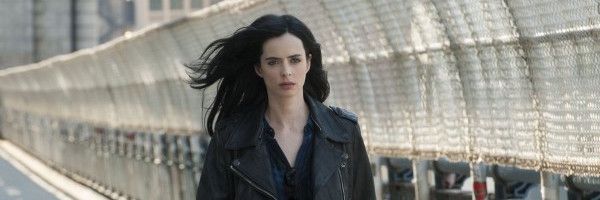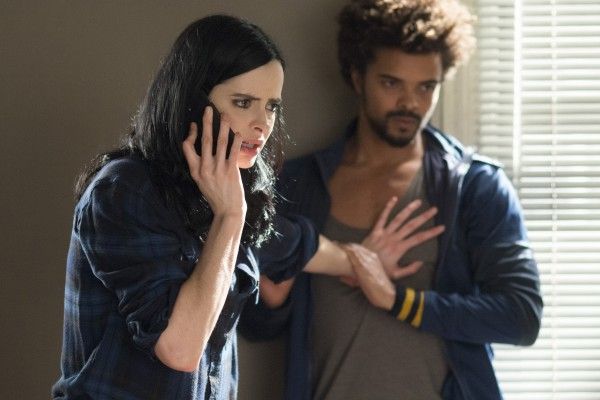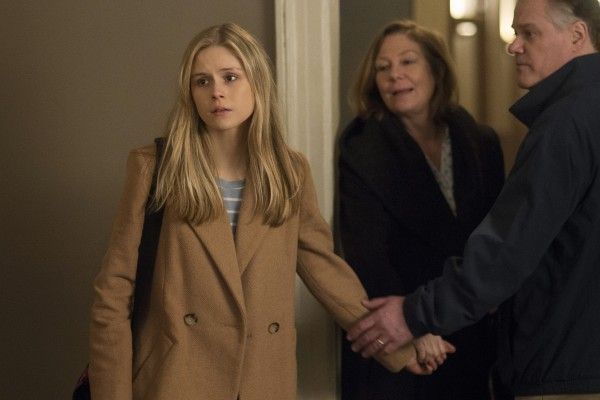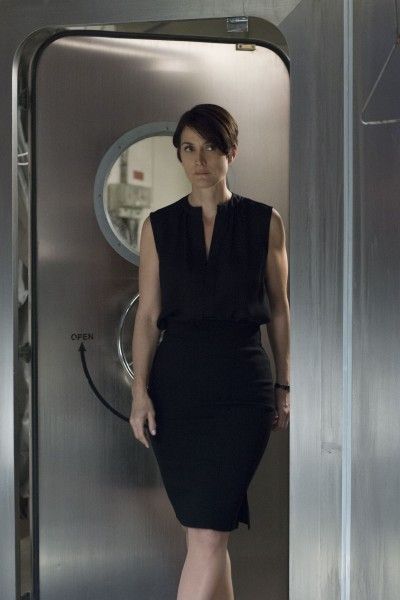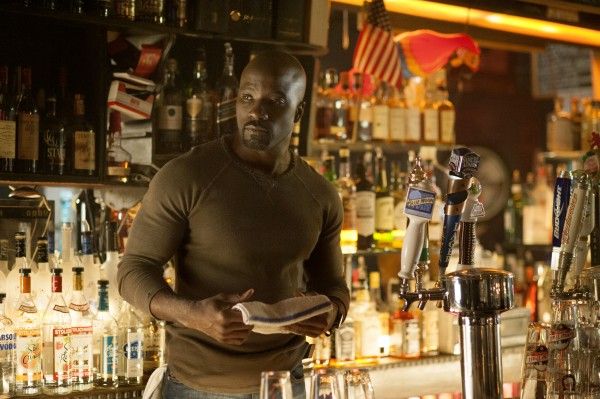New recaps of Jessica Jones will post Mondays and Thursdays.
Back at New York Comic Con, I wrote up my thoughts on the pilot episode of Jessica Jones. Going in, I heard rumors that they were going to play this episode, but what I didn’t realize is that Marvel was going to take such a bold new road in storytelling with their latest Netflix endeavor. While the comic itself was meant for an “adults only” crowd, I thought surely they wouldn’t go as deep with the television show. After all, while Daredevil may have been violent and dark, there were some territories that I felt Marvel may not be willing to tread which Jessica Jones explored. Needless to say, I was proven wrong with the series going deeper, darker, and more personal than you felt possible for a Marvel property that was under the wing of Walt Disney. Now, I’m able to fully talk about what I saw in the pilot, “AKA Ladies Night”, along with the episode that followed it in “AKA Crush Syndrome”.
Jessica Jones is the story of a Private Investigator who is a deeply broken mess of a human being (something that other characters in the show are able to pick up on almost immediately). She takes cases while heavily drinking, repeats a mantra under her breath of street names, and generally barely manages to keep her life together, all while harboring super powers. Krysten Ritter brings Jessica to the screen, with a sarcastic wit that bites as hard she punches, able to perfectly handle her persona of hard exterior, yet tortured soul, pitch perfectly. In the first episode, Jessica finds herself hired on by the parents of a missing girl (Hope Shlottman, played by Erin Moriarty) who are looking for their daughter on the mean streets of New York City. Unfortunately for Jessica, this run-of-the-mill case turns out to dredge up a horrible time period of her life, one that caused her to stop all super heroics.
I would be remiss if I didn’t mention the antagonist of the show, who (for as good a character as Jessica is) is really the most sterling example of what this show has to offer. Kilgrave, as played by Dr. Who’s David Tennant, is a monster. In every sense of the word, he is the scariest Marvel villain we have seen to date, and should be used as an example for Marvel in creating their villains moving forward. You won’t be finding any quips from this character like a certain robot in a certain Avengers sequel; instead, you’ll find straight horror, as Kilgrave uses his ability to rip his way through regular peoples’ lives. Kilgrave's power is the ability to have people do whatever he wants them to, which is a scary enough concept on its own, but when its harbored by a certifiable psychopath, it’s made even more so. When Jessica discovers that the reason for Hope’s disappearance is that she’s placed under the spell of Kilgrave, things go from bad to worse.
Rather than attempt to save the girl, Jessica immediately tries to book a flight to Hong Kong to get as far away as possible. This is a great example of building up the menace of “The Purple Man” (as he's known in the comics) without going overboard, or heck, having him appear at all in the first episode, which he does not. Jessica though manages to gather her courage, and tracks down Hope, locating her in a hotel room where she has been told to not move by Kilgrave. Once Jessica brings back the grateful girl to her parents, they whisk her away onto an elevator, only for Jess to hear shots ring out, run to their rescue and encounter a smiling Hope, emptying the contents of a .45 into the bodies of her now dead parents. “Smile,” she tells Jessica, as she then realizes what she did and slumps into a wailing mess. The ending of this episode is something else, I can tell you that. It’s dark, horrific, and when I saw the pilot originally in New York, the crowd went silent in awe of just how raw it was. It makes for a fantastic primer into just what kind of world the audience is entering, which is something all pilot episodes should aim to do.
In "AKA Crush Syndrome," Jessica attempts to save Hope from crimes she wasn’t in control of by trying to unravel the mystery of how Kilgrave is alive, following a bus accident months earlier. The driver she encounters is yet another broken figure left in Kilgrave’s wake, having given him his own kidney (or two), against his will, to save his life. At the tail end of the episode, we’re given our first appearance of Tennant’s character, as he casually walks into a normal family’s home and begins playfully dismantling them as their new “permanent guest.” Watching the young children lock themselves in the closet against their will to most likely die of dehydration/starvation was hard to stomach. This series, if anything, is jam-packed full of compelling yet cringe-worthy scenes that present an entirely new side of the on-screen Marvel Universe that has not been seen in the stories of time-lost super soldiers and iron-clad billionaire playboys.
I’ve barely scratched the surface of this show considering I haven’t even touched upon the supporting characters that made appearances. The biggest, both literally and figuratively, is Luke Cage, played by Mike Colter. Luke is a simple man who tends bar, tries to live his life, and may eventually become a card-carrying member of the Avengers, should the comics have anything to say about it. The dynamic between Luke and Jessica is a noteworthy aspect of the show, with Jessica trying to keep people at arm’s length and Luke not taking crap from her, or any one for that matter. The "opposites attract" dynamic between the couple feels real here, and it has you rooting for them to work out as they both will obviously have some hurdles to jump over along the way, especially as Luke discovers Jessica’s secret quite early on. Jessica also has another supporting cast member she relies on in the form of her BFF, Trish Walker, played by Rachael Taylor. Trish is a radio talk show host who knows everything about her friend’s life, trying to help hold Jessica together while not being afraid to give her a nice swift kick in the ass. The relationship between these two, much like the Luke and Jessica dynamic, doesn’t feel manufactured and it’s one of the best examples of a close friendship bond I’ve seen this year in television.
Honestly, I could go on and on about why you should watch this show. I can continue telling you how it’s yet another Marvel experiment gone right. I can continue telling you about how David Tennant has walked into the shoes of what may be his greatest role. I can even continue telling you about how this show may even surpass Daredevil when all is said and done! At the end of the day, don’t take my word for it, watch it for yourself and take a long shower to wash the grit and grim of the Marvel Universe’s latest entry into its seedy underbelly off you. Jessica Jones is one of the strongest shows to drop this year and these episodes are just a taste of what's the come.
Rating:
AKA Ladies Night - ★★★★★ Excellent
AKA Crush Syndrome - ★★★★★ Excellent
AKA Purple Notes
- For those who don’t know, Trish “Patsy” Walker is a Marvel hero in her own right named Hellcat. You start seeing hints at this with Trish revealing her secret training room in her apartment. Maybe she’ll don the yellow spandex in time to join the rest of the Defenders when that Netflix series hits the scene.
- Carrie-Anne Moss as Jeri Hogarth is an interesting foil for Jessica, in so much as she has her life in complete control, it seems, minus her messy relationship with her wife.
- Doubt we’ll be seeing Kilgrave rip off his skin to reveal a shade of purple underneath or anything, but hey, a man can dream.
- Jessica’s neighbors are way worse off than she is. I cringed pretty hard when we were introduced to the brother/sister pair. Reminded me of the McPoyles from It’s Always Sunny in Philidelphia.
- “SWEET CHRISTMAS!”

